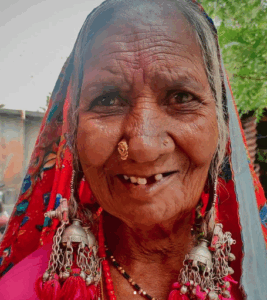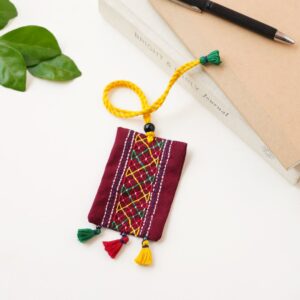When Rohit Rathod’s grandfather came to see his grandmother to seek her hand in marriage, his family did not see the prospective bride. Instead, they looked at the embroidery of her attire! Rohit says it told them all they needed to know about the girl: her attention to detail, her sense of aesthetics, and whether she would be a good daughter-in-law.
‘We cannot try that now,’ laughs Rohit, whose initiative focuses on reviving the traditional embroidery form, ‘but you can imagine how important the craft was in those days.’
Banjara embroidery is a distinct form of needlework characterized by the addition of accessories, such as cowrie shells, mirrors, coins, and other embellishments, to the main stitches. Patchwork and bright colours with a predominance of red are hallmarks of Banjara embroidery.
 Rohit started creating Banjara embroidery products with a modern twist. All women of his village, and indeed, of his community, know how to do Banjara embroidery, but very few thought of it as having any commercial value, he says.
Rohit started creating Banjara embroidery products with a modern twist. All women of his village, and indeed, of his community, know how to do Banjara embroidery, but very few thought of it as having any commercial value, he says.
‘In fact, they gave away many of their heirloom embroidery products in exchange for things like stainless steel plates. They were so innocent of its real value,’ says Rohit.
Rohit was inspired by his grandmother to take on the popularization of the craft and to revive it to his heyday. This was around four years ago, when COVID had struck. He started out small, with his family. First, he learnt all the embroidery stitches, around 70 of them, from his grandmother. He then started training women in his village. They already knew basic embroidery, and all he had to do was train them on some more traditional factors of the craft, and on finishing. He currently works with 25 artisans and counting.
Ironically, when he trains, he has to train women to go back, to when their grandmothers did the embroidery. ‘The craft itself changed over time, and more mirror work crept in. In our traditional embroidery, the stitches are different, and we work on cotton,’ he says. He is trying to bring back the OG form of banjara embroidery, albeit with better finish.
Rohit is hoping for the new generation to pick up Banjara embroidery not just as a one-off statement, but make it a part of everyday life. Towards that end, he wants to focus on functional Banjara embroidery products and Banjara embroidery gifts.
Talking about the partnership with Club Artizen, he says the design inputs given, especially for the Banjara embroidery luggage tag, were very helpful. ‘Our bestsellers are jewellery, and because we are surrounded by it, we sometimes cannot think beyond what we have seen. We are happy that Club Artizen is able to give us new ideas for our products,’ he says.
<hr />
<h1>Our Banjara Embroidery Products</h1>


